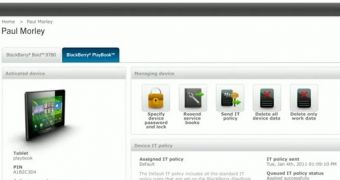Teased by Research In Motion (RIM) several weeks ago, the BlackBerry Mobile Fusion MDM (mobile device management) solution for enterprise customers has just been launched on the market.
The new service is based on RIM’s BlackBerry Enterprise Server and aims to deliver a “cost-efficient, secure, reliable and scalable solution.”
According to RIM, the solution is fully compatible with smartphones and tablets running BlackBerry OS, including the PlayBook tablet and future BlackBerry 10 devices.
Aside from that, the service supports devices that run other mobile operating systems, such as Google’s Android and Apple’s iOS platforms.
BlackBerry Mobile Fusion enables users to manage all their devices regardless of the platform they operate, in a single, web-based console.
The following mobile device management (MDM) capabilities are available for iOS and Android devices: support for multiple devices per user, application and software management, connectivity management (Wi-Fi, VPN, certificates) and more.
“For businesses and government, managing a mix of mobile devices on any scale is chaotic. Organizations face pressure to allow employees to bring their own devices into the workplace, and they are looking to RIM as the global leader in the enterprise mobility space to solve that problem,” said Alan Panezic, vice president, enterprise product management and marketing at Research In Motion.
Potential customers should know that BlackBerry Mobile Fusion software is available as a free download, but it is priced by the number of devices being managed.
RIM mentions that client access licenses (CALs) start at $99 (€75) per user or $4 (€3) per user per month, which is billed annually. It is also worth mentioning that RIM is offering a 60-day free trial, which is available here.
“BlackBerry Mobile Fusion allows organizations to manage a mixed environment of devices in the most secure, simple, and cost efficient manner possible. It also means that businesses and government do not have to move to the lowest common denominator on security for all the devices they need to manage,” concluded Panezic.

 14 DAY TRIAL //
14 DAY TRIAL // 